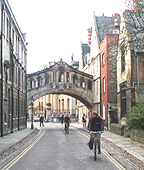TRAINING PROGRAMS . . . COURSES . . . LECTURES . . .
.TRANSATLANTIC DOCTORAL PROGRAMS
 |
|
Cambridge
|
 |
|
Oxford
|
Two doctoral programs partner NIH with either Oxford or Cambridge University in the U.K. to offer students scholarships to earn a D.Phil. degree in biomedical and health research—the NIH-Oxford University Scholars in Biomedical Research Program and the NIH-Cambridge University Health Sciences Research Scholars Program.
Award recipients participate in an interdisciplinary training program and a collaborative research project under the joint mentorship of intramural faculty of two institutions: the NIH and either Oxford or Cambridge University. Participants spend equal time in NIH and U.K.laboratories as they progress towards their degrees. These programs have succeeded in attracting excellent American science students.
Projects currently pursued span a broad range of disciplines, including neurobiology, genetics, structural biology, molecular biology, immunology, cancer biology, and clinical sciences.
To Be a Mentor
Intramural investigators in all institutes (including those who are not stationed at the Bethesda campus) are eligible to collaborate in the training of a scholar. To serve as a mentor, the principal investigator (that is, tenure track and above) must be supervising an independent research program.
The potential mentor’s first step is to contact investigators at Oxford or Cambridge (also tenure track and above) and determine areas of interest for collaboration.
Second, the mentor sends a brief description of collaborative project area(s), with links to the web pages and/or e-mail addresses to Andre Nussenzweig.
Nussenzweig can also provide more details about the responsibilities of being a mentor in this program. The next class of Scholars will begin laboratory selection in April, 2004, so it would be best to submit your collaboration prior to that time.
These investigator-initiated projects will then be advertised to scholars, who are encouraged to discuss them directly with the PIs. It is also possible for a scholar to create a course of study with a particular mentor in mind and initiate contact with that person.
To Be a Scholar
To be eligible for this program, a student must be a U.S. citizen or permanent resident with a bachelor’s degree from an accredited U.S. college or university. There is also limited eligibility, determined on a case-by-case basis, for British students at Oxford or Cambridge universities. All applicants are expected to have had undergraduate preparation in biology, chemistry (inorganic and organic), physics, and mathematics.
Candidates should demonstrate outstanding academic performance and promise for a career in biomedical research. Previous laboratory research experience is also a strong qualification for this program.
Students already enrolled in medical schools, as well as college graduates interested in pursuing a D.Phil., are encouraged to apply.
There is also an Advanced Scholar track for second- or third-year graduate students in the biomedical sciences at Oxford or Cambridge, which provides support for additional years of graduate work to carry out research in an intramural laboratory at NIH.
This past summer, program mentors and scholars gathered at Oxford for the programs’ first scientific colloquium. Scholars’ work was showcased, and Nobel laureate Baruch Blumberg gave an after-dinner talk on his life in research.
For more information on the Advanced Scholar track or for other questions relating to the Oxford and Cambridge programs, contact Michael Lenardo, who coordinates both.
For further information
on these as well as other new doctoral programs for the intramural program,
view the Graduate Partnerships Programs web
page.
![]()
Two deadlines are coming up March 1: the NIH-Duke Training Program in Clinical Research and the University of Pittsburgh Training in Clinical Research Program.
The Duke program is designed primarily for physicians and dentists; it’s offered via videoconference at the Clinical Center and includes formal courses in statistical analysis and clinical research design and management.
Academic credit may be applied toward a Master of Health Sciences in Clinical Research degree from Duke University School of Medicine, Durham, N.C.
The Pittsburgh program is designed for Ph.D.s and allied health professionals (though physicians and dentists may also enroll) and spans three semesters, starting with an intensive eight-week summer session, the first five days of which are held at the university.
Participants can earn either a Certificate in Clinical Research (15 credits) or a Master of Science in Clinical Research (30 credits) from the University of Pittsburgh School of Medicine.
Applications for the 2004–2005 sessions of both these programs are available at the Clinical Center, Office of Clinical Research Training and Medical Education, Building 10, Room B1L403.
For more information
on the Duke program and tuition, visit the website
or send an e-mail; for
more information on the Pittsburgh program, visit that website
or send an e-mail. ![]()